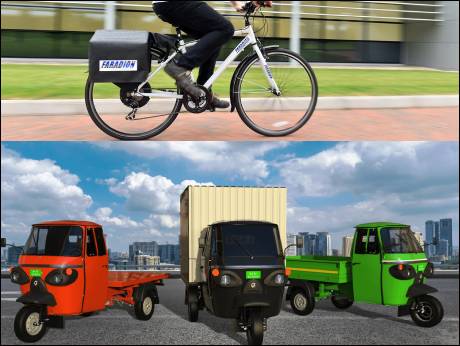
UK-based sodium-ion battery pioneer acquired; invstment in Bangalore e-vehicle startup
January 22 2022 Is there an emerging tech trend to be discerned in the recent acquisition by Reliance Industries of the UK based Faradion, a world leader in Sodium-ion battery technology that provides low cost, high-performance, safe and sustainable energy, and this week's strategic investmnent in Bangalore-based last mile e-,mobility player Altigreen?
Faradion's proprietary technology delivers leading-edge, cost-effective solutions for a broad range of applications; including mobility, energy storage, backup power and energy in remote locations.
Faradion was started in 2011, by Dr Jerry Barker, Dr Chris Wright and Ashwin Kumaraswamy, to develop and bring to market sodium-ion technology. It has developed a strategic, wide-reaching and extensive IP portfolio, comprising 21 patent families covering Na-ion technology.
Reliance will use Faradion’s technology at its proposed fully integrated energy storage factory, the Dhirubhai Ambani Green Energy Giga Complex project at Jamnagar.
Said Chairman of Reliance Industries Mukesh Ambani in a statement:“We welcome Faradion and its experienced team to Reliance family. This will further strengthen and build upon our ambition to create one of the most advanced and integrated New Energy ecosystem and put India at the forefront of leading battery technologies. The sodium-ion technology developed by Faradion provides a globally leading energy storage and battery solution which is safe, sustainable, provides high energy density, and is significantly cost competitive. In addition, it has wide use applications from mobility to grid scale storage and back-up power.”
He added: “Most importantly, it utilizes sodium, which will secure India’s energy storage requirements for its large renewable energy and fast-growing EV charging market. We will work with Faradion management and accelerate its plans to commercialize the technology through building integrated and end-to-end giga scale manufacturing in India. We believe this will be one of our many steps that will also enable, accelerate, and secure large scale energy storage requirements for our Indian partners developing and transforming India’s EV mobility and transport sector.”
Said Faradion CEO James Quinn: “Faradion has been one of the first to champion sodium-ion battery technology. Reliance is the perfect partner for supporting Faradion’s growth in the rapidly expanding Indian market and to jointly speed up the transformation of the global energy market. Becoming part of the Reliance group validates the incredible work our team has done in advancing sodium-ion technology. Together with Reliance, Faradion can bring British innovation to India and globally, as the world increasingly looks beyond lithium. We look forward to being part of India’s Net Zero mission.”
Link to Faradion-Reliance announcement here
Added Dr. Chris Wright, chairman and cofounder of Faradion: “Dr Jerry Barker, Ashwin Kumaraswamy, and I founded Faradion to develop sodium-ion technology and bring it to market, with funds from Mercia Asset Management. This deal with Reliance firmly establishes Faradion’s sodium-ion batteries as an integral part of the global value chain for cheaper, cleaner, more sustainable energy for decades to come.”
Techadvantage
Sodium-ion cells are an excellent drop-in replacement for lead-acid batteries for low cost electric transport – in LSEVs, e-scooters or as batteries for e-rickshaws and e-bikes – offering much greater range and carrying capacity for a similar price.
They also have potential for the S-L-I (starter-lighting-ignition) 12V battery or the 48V battery in a MHEV (mild hybrid electric vehicle). This is because Na-ion has higher energy density than lead acid batteries, as well as improved performance over a wide temperature range.
Sodium -ion’s advantages over lithium-ion and lead-acid include:
-No dependence or use of cobalt, lithium, copper, or graphite.
-Patented zero-volt safe transport and storage.
-Uses existing lithium-ion manufacturing infrastructure which makes it scalable has fast charge and discharge capabilities
Faradion demonstrated the world’s first sodium-ion battery powered vehicle when it launched its e-bike battery demonstrator in collaboration with Williams Advanced Engineering and Oxford University.
Altigreen vehicles could be trial platforms
Reliance may be able to try out the sodium-ion batteries, earlier rather than later. This week, Reliance Industries’s energy arm Reliance New Energy Limited (RNEL) entered into an agreement to invest Rs 501 Million (Rs 50.16 crore) in Bangalore last mile e-mobility startup Altigreen.
RNEL joined four venture capital funds -- Sixth Sense Ventures, Xponentia Capital, Accurant International of the US and Singapore's Momentum Venture Capital -- to invest a combines Rs 3billion ( 300 crore) in the electric commercial vehicle maker
Altigreen has developed an electric three-wheeler, using a locally made mobility platform. The nine-year-old company has 26 global patents spanning 60 countries, as per the RIL statement.
"A good part of the investment will be in R&D. We have on board investors who are also bringing their expertise to the table. For one, Reliance New Energy is investing heavily in non-li-ion batteries and we get access to those technologies," Altigreen cofounder Amitabh Saran told Economic Times.